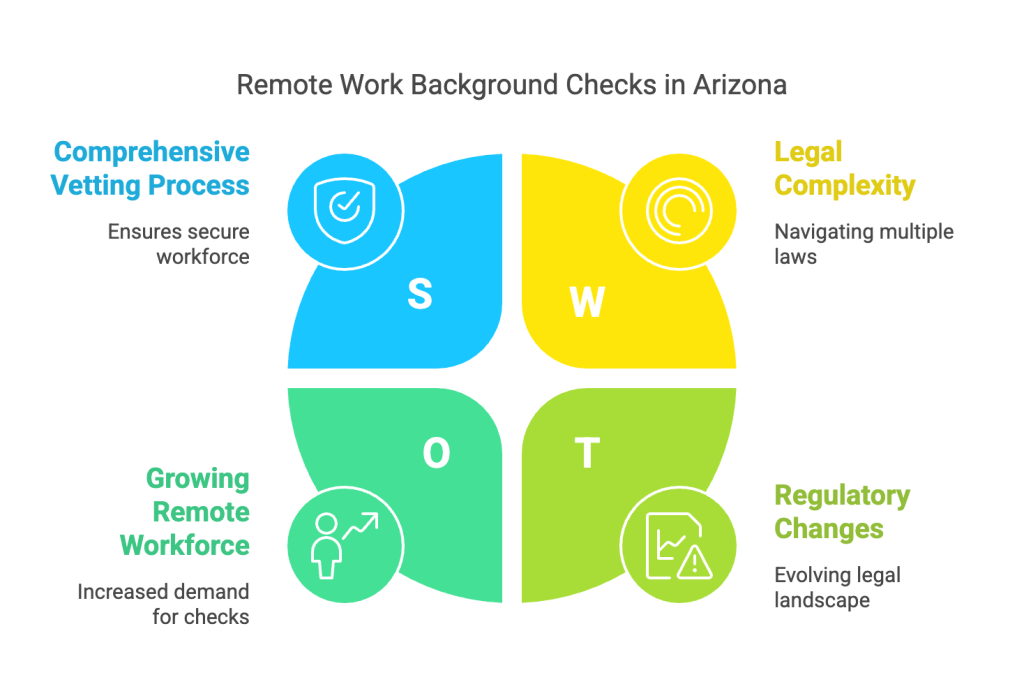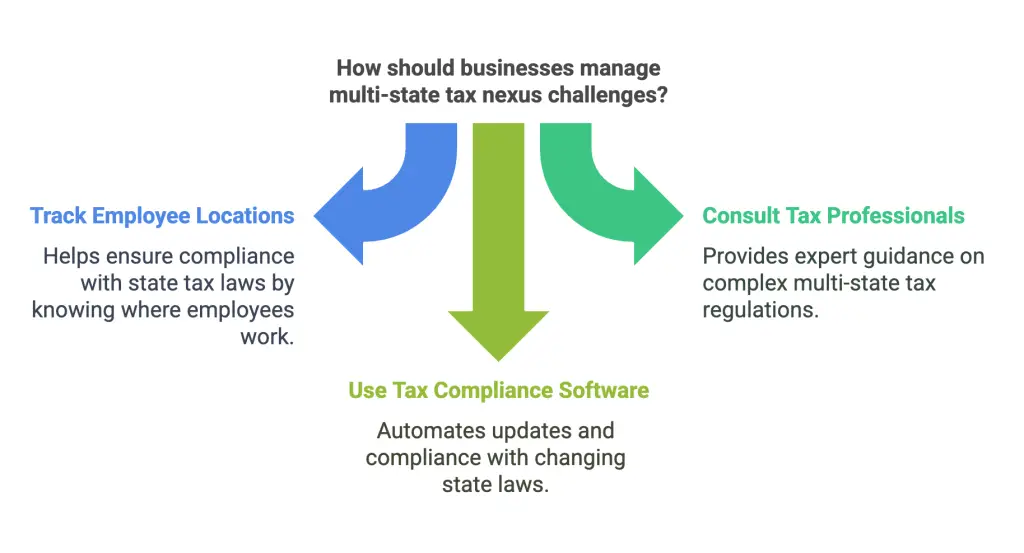In the era of remote work, Arizona stands at the crossroads of innovative employment practices and complex regulatory landscapes. For businesses operating remotely, understanding the intricacies of Arizona remote work checks is essential. This guide dives deep into the unique challenges and requirements of conducting background checks for remote employees, especially those in a multi-state tax nexus, shedding light on compliance and screening protocols.
Key Takeaways
- Since the pandemic, remote work has grown, and Arizona has emerged as a crucial hub for it due to its business-friendly nature.
- Conducting background checks on remote employees is essential for Arizona businesses to ensure compliance with state and federal laws.
- The concept of a multi-state tax nexus presents challenges for Arizona businesses hiring remote workers in different states, which may lead to varied tax obligations.
- Key components of Arizona remote work checks include identity verification and compliance with both Arizona and the home stateâs laws for out-of-state candidates.
- Legal responsibilities extend beyond background checks, requiring you to protect remote work data and ensure compliance, which prevents legal issues.
Introduction
Remote work has soared since the pandemic began, reshaping how businesses function. Arizona, in particular, has become an important hub for remote work, driven by its appeal as a business-friendly state. Businesses are experiencing a shift that requires a fresh look at hiring practices, especially concerning remote work background checks.
Background checks aren't just another box to tick in the hiring process. They're crucial for ensuring you hire qualified, trustworthy individuals, protecting your business from potential legal issues, and maintaining a secure working environment. For Arizona companies hiring remote workers across state lines, the situation becomes even more intricate due to diverse state laws and tax regulations.
This article offers a thorough exploration of the critical aspects of remote work background checks in Arizona. We focus on the legal complexities and logistics that come with navigating a multi-state tax nexus, laying out the key steps to ensure you're on the right track with compliance.
Understanding Remote Work Background Checks in Arizona
Arizona remote work checks involve a set of procedures designed to ensure that remote employees are accurately vetted, particularly within the state's regulatory framework. This process generally includes verifying identity, assessing criminal history, and adhering to state-specific limitations and requirements. These checks serve as a crucial component in maintaining a secure and reliable workforce, especially as the number of remote workers continues to grow.

The legal framework for background checks in Arizona aligns closely with federal guidelines, as outlined by entities like the EEOC. Employers must navigate both federal and state laws, which means they have to stay informed about varying legislative nuances. Arizona law, for instance, requires compliance with specific guidelines about what information can be collected and how it can be used. For example, certain restrictions may prevent employers from considering arrest records that didnât lead to a conviction.
The scope of these checks typically includes criminal background checks, employment verification, and sometimes credit checks. However, Arizona imposes limitations on the use of credit information in hiring decisions, unless it's relevant to the position. Employers should be particularly aware of these boundaries to avoid discriminatory practices.
What does this mean for you as an employer? You need to ensure that your background check process is both comprehensive and compliant with state and federal laws. You might ask yourself: Are your current procedures in line with Arizona regulations? How do you ensure that your remote workers are properly vetted while respecting their privacy rights? These questions underscore the importance of staying updated and maintaining a nuanced understanding of both Arizonaâs and federal guidelines when conducting remote work checks.
The Multi-State Tax Nexus Challenge
Understanding a multi-state tax nexus is crucial for employers with remote teams. In simple terms, a tax nexus is a connection between a business and a state, obligating the business to comply with that stateâs tax laws. When remote employees work across various states, each state may have differing tax obligations for both the employer and employee.
Arizona, like many states, has specific tax regulations impacting businesses employing out-of-state workers. These regulations determine when a business must collect and remit income tax for remote employees. If an employee resides or works remotely in a state other than Arizona, the business might need to register and pay taxes in that state, depending on the economic and physical presence established by the employee's work activities.
Compliance can be a tough nut to crack. Various states have different thresholds and rules, often changing the definition of what constitutes a tax nexus. For instance, hiring just one remote worker in a new state may require registrations, payroll adjustments, and tax filings in that state. Missteps can result in legal penalties, financial liabilities, and administrative burdens.

For a streamlined approach, businesses should track where their employees are working and consult a tax professional familiar with multi-state regulations. Investing in tax compliance software that automatically updates state laws can also prevent potential pitfalls. Consider whether your business has the resources and infrastructure to handle these complexities before hiring across state lines. Are you prepared to manage the intricate tax filings for each employee working remotely in a different state?
Essential Components of Arizona Remote Work Checks
When conducting background checks for remote work in Arizona, there are several crucial components to address, ensuring both compliance and efficacy.
Identity Verification: Verify each candidate's identity with precision. This first step is critical, particularly in a virtual setting where face-to-face meetings are rare. Utilize tools like government-issued ID checks or electronic verification services. This guards against ID theft and fraud, providing peace of mind that you're hiring who you think you are.
Criminal Background Checks: Arizona has its own guidelines for criminal history checks, which must align with federal standards such as those set by the Fair Credit Reporting Act (FCRA). Carefully consider the position's nature before making decisions based on criminal history to ensure compliance with Equal Employment Opportunity Commission (EEOC) guidelines. Arizona also restricts the use of certain records, like those that have been sealed or expunged, so understand these nuances.
AZ Out-of-State Screening: When hiring candidates from outside Arizona, remember that you must comply with both Arizona's laws and the candidateâs home state regulations. This can get complicated, so consulting legal or regulatory experts is wise. Each state may have vastly different rules for what constitutes a legitimate background check, and double-checking these is crucial in avoiding legal pitfalls.
Telecommuting Compliance: Telecommuting introduces challenges in privacy and data protection. Arizona law requires you to protect candidates' personal information vigilantly. This means having robust data security measures and clear policies on handling sensitive information. Do you have encryption safeguards in place? How do you ensure only authorized personnel access applicant data? These are questions to address to avoid potential breaches and penalties.
Balancing compliance with thoroughness can be a tightrope walk, but understanding these components can help you execute remote work background checks effectively and legally.
Implementing Effective Screening Processes
When conducting remote work background checks, it's vital to keep the process straightforward, efficient, and compliant with regulations. Here are some best practices to follow:
- Best Practices for Employers: Start with clear policies. Document every step of your screening process. Training your HR team on compliance and privacy standards is essential. Keep communication open with candidates about what checks will be performed, ensuring transparency.
- Technology and Automation: Leverage technology to streamline operations. Tools that automate data collection and verification reduce errors and speed up the process. Choose platforms that offer secure, up-to-date compliance features to meet both state and federal regulations.
- Internal Processes: Develop strong internal protocols to handle screening. Assign dedicated staff to oversee compliance and regularly audit your processes. Maintain detailed records of your checks and ensure data security measures are in place to protect candidate information.
By integrating these approaches, you not only enhance efficiency but also ensure that your remote hiring practices meet the necessary legal requirements. Are you reviewing your screening processes regularly to adapt to new challenges and technologies? It's crucial to stay proactive in today's dynamic work environment.
Arizona Remote Work and Beyond: A Case for Adaptation
Every shift in the workplace brings stories of those who thrive and learn. One company, a tech firm based in Phoenix, successfully maneuvered the intricacies of Arizona's remote work checks. They employed a blend of technology and local expertise to manage their background screening process. By prioritizing identity verification and adhering to both Arizona and federal guidelines, they stayed compliant while expanding their workforce across state lines.
This firm discovered that one-size-fits-all solutions seldom work for remote work compliance. They faced issues with different state tax regulations impacting their remote employees. For instance, they had to adjust their internal processes to accommodate Arizona's specific tax rules while maintaining uniform standards across their workforce. This was no small feat, yet they managed by employing a dedicated compliance officer to navigate these challenges, ensuring they met both tax and employment regulations.
Common problems include navigating varied state laws and managing privacy concerns during remote hiring. However, practical solutions exist. Leveraging technology to automate identity checks and criminal history screenings can ease the burden. Establishing clear procedures for multi-state tax compliance is crucial. Partnering with background check services that understand Arizona-specific laws can also give you an edge.
Successfully managing remote work compliance doesn't just avoid penalties; it creates a smoother hiring process and a more stable workforce. If you're dealing with remote workers in Arizona, consider these best practices and learn from those who have successfully adapted.
Legal Considerations and Compliance
Understanding the legal landscape of background checks is crucial for Arizona employers. The EEOC guidelines provide a solid foundation. They emphasize fair treatment and non-discrimination in hiring processes. Employers must avoid practices that disproportionately affect certain groups. For instance, blanket policies excluding applicants with criminal records might be discriminatory if not job-related.
Arizona has its own set of rules, but they must be navigated in conjunction with federal laws. Arizona's regulations may appear straightforward, yet federal laws such as the Fair Credit Reporting Act (FCRA) bring additional layers. One key aspect is obtaining explicit consent from candidates before conducting checks. You must also inform them if the decision to hire them is influenced by the information obtained in these checks.
Balancing state and federal requirements is a task that demands attention. Federal laws often take precedence, but states can impose stricter standards. For example, Arizona might require specific disclosures, while federal regulations could mandate more comprehensive reporting.
Your role as an employer extends to implementing robust telecommuting policies. It's not just about compliance but about fostering a trustworthy remote work environment. Ensure that any data collected through background checks is secure. Privacy breaches can lead to significant legal repercussions and damage to your organization's reputation.
Employers in Arizona have a duty to maintain awareness of these legal obligations. Staying informed helps in creating fair and equitable employment practices. Use legal resources or consult with employment law experts to ensure all bases are covered.
Conclusion
Looking forward, as remote work continues its upward trajectory, staying adaptable and informed about evolving regulations is vital. The landscape of remote work compliance is ever-changing, and the ability to adapt will be a defining characteristic of successful businesses. Employers and HR professionals are encouraged to remain proactive in understanding these dynamics, ensuring their practices remain current and compliant.
Frequently Asked Questions (FAQs)
Do AZ checks apply to remote workers in other states?
Yes, Arizona employers must follow both Arizona and the employee's local laws for background checks when hiring remote workers from other states.
How to verify education for remote hires in AZ?
You can contact educational institutions directly to confirm degrees. Alternatively, use third-party verification services that specialize in educational checks.
Can AZ employers require drug tests for remote workers?
Yes, Arizona employers may require drug tests. However, they need to consider the drug testing laws of the state where the remote worker resides.
Are AZ companies liable for other statesâ laws?
Yes, when hiring remote workers in other states, Arizona companies must comply with those states' employment laws.
How to handle county-specific checks for AZ remote hires?
Use a professional background check service that covers county-specific records or contact the counties directly for accurate information.
Can remote workers sue AZ employers for FCRA violations?
Yes, remote employees can sue Arizona employers for violations of the Fair Credit Reporting Act if their background checks do not comply with the law.
Do international remote workers fall under AZ laws?
International workers primarily fall under the employment laws of their own country. However, Arizona employers must ensure compliance with U.S. federal laws, such as I-9 requirements.
Are gig workers considered remote employees in AZ?
Gig workers are typically considered independent contractors, not employees. This distinction affects taxes, benefits, and employment laws.
Whatâs the cost of multi-state checks in Arizona?
The cost varies based on the depth of the background check. Comprehensive checks can range from $50 to several hundred dollars per employee.
Does AZ require I-9 verification for remote hires?
Yes, all U.S. employers, including those in Arizona, must complete an I-9 form for every employee to verify their identity and eligibility to work in the U.S.
Do remote workers need to register their home office as a business in AZ?
No, remote workers do not usually need to register their home offices as businesses unless they are conducting independent business operations.
Are Arizona employers required to provide equipment for remote workers?
There is no legal requirement for Arizona employers to provide equipment, but it is considered best practice to ensure employees have what they need to perform their jobs effectively.
Can Arizona companies enforce non-compete agreements with remote employees?
Yes, Arizona companies can enforce non-compete agreements, but they must be reasonable in duration, geographical scope, and scope of activities restricted.
Do Arizona's minimum wage laws apply to remote workers living in other states?
No, remote workers are generally subject to the minimum wage laws of the state where they reside, not Arizona.
Definitions
- Remote Work: A work arrangement where employees perform their job duties from a location outside the traditional office, often from home. This setup requires clear policies on communication, cybersecurity, and performance expectations.
- Background Checks: A screening process employers use to verify a candidateâs identity, work history, criminal record, or other relevant details. These checks help ensure trustworthy hires and compliance with state and federal laws.
- Employment Verification: A step in the hiring process where an employer confirms a candidateâs job history, including past employers, job titles, and dates of employment. This helps validate experience and prevent résumé fraud.
- Tax Nexus: A legal term describing a businessâs connection to a state that requires tax registration and compliance. Hiring remote employees in different states can create tax obligations for employers.
- Compliance: Following laws, regulations, and company policies that apply to hiring, employment, and workplace practices. This includes adhering to background check laws, tax requirements, and privacy protections.
References
- https://www.bls.gov/opub/btn/volume-13/remote-work-productivity.htm
- https://news.asu.edu/20200518-discoveries-remote-working-could-shift-how-employees-identify-companies-asu-expert-says

GCheck Editorial Team
Meet the GCheck Editorial Team, your trusted source for insightful and up-to-date information in the world of employment background checks. Committed to delivering the latest trends, best practices, and industry insights, our team is dedicated to keeping you informed.
With a passion for ensuring accuracy, compliance, and efficiency in background screening, we are your go-to experts in the field. Stay tuned for our comprehensive articles, guides, and analysis, designed to empower businesses and individuals with the knowledge they need to make informed decisions.
At GCheck, we're here to guide you through the complexities of background checks, every step of the way.





